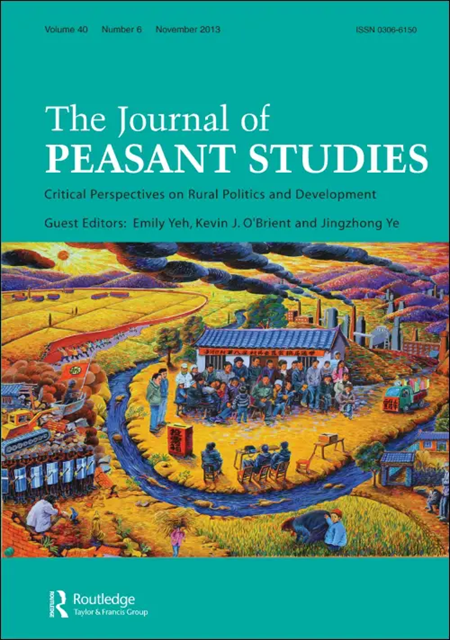这里能有食物主权吗?
IF 4.8
1区 社会学
Q1 ANTHROPOLOGY
引用次数: 52
摘要
粮食主权运动的核心人物是“中农”,一个谨慎的人物,在对生态和市场风险的强烈厌恶的指导下,平衡粮食与经济作物生产。根据在印度尼西亚苏拉威西高原的长期实地研究,本文解释了为什么农民从粮食生产转向单一作物可可生产,而没有出现稳定的中农。它概述了他们转变的原因,他们在小块劣质土地上维持生计的努力,以及很快出现的迅速两极分化。讽刺的是,他们对农场的依赖增加了他们的脆弱性。世界上许多地方的农民表面上是自主的,但实际上是由国家转移、汇款或有工资的工作支持的,与他们不同的是,这些农民只能靠自己。竞争的资本主义关系迅速出现,并呈现出一种特别有害的、几乎是教科书式的形式。这些关系是强制性的。土地不足的农民,以及新近失去土地的高地居民,不能选择退出,这挑战了自由主义选择观念框架下的粮食主权观念。即使小规模农民没有受到土地掠夺或企业计划的影响,扩大他们对自己的粮食、农场和未来的控制能力仍然是一个巨大的挑战。本文章由计算机程序翻译,如有差异,请以英文原文为准。
Can there be food sovereignty here?
A central figure in the food sovereignty movement is the ‘middle peasant’, a cautious figure who balances food with cash-crop production, guided by a strong aversion to ecological and market risk. Drawing on long-term field research in highland Sulawesi, Indonesia, this article explains why farmers switched from food to mono-crop cacao production, and a stable middle peasantry did not emerge. It outlines their reasons for the switch, their struggles to make ends meet on small plots of poor-quality land, and the rapid polarization that soon arose. Ironically, their farm-dependence increased their vulnerability. Unlike farmers in many parts of the world who appear to be autonomous but are actually supported by state transfers, remittances or wage work, these farmers were on their own. Competitive capitalist relations quickly emerged and took on an especially virulent, almost textbook form. These relations were compulsory. Farmers with inadequate plots of land, and newly landless highlanders, could not opt out, challenging notions of food sovereignty framed in terms of liberal notions of choice. Even when small-scale farmers are untouched by land grabbing or corporate schemes, as in this case, expanding their capacity to exercise control over their food, their farms and their futures is still a huge challenge.
求助全文
通过发布文献求助,成功后即可免费获取论文全文。
去求助
来源期刊

Journal of Peasant Studies
Multiple-
CiteScore
10.50
自引率
17.60%
发文量
99
期刊介绍:
A leading journal in the field of rural politics and development, The Journal of Peasant Studies (JPS) provokes and promotes critical thinking about social structures, institutions, actors and processes of change in and in relation to the rural world. It fosters inquiry into how agrarian power relations between classes and other social groups are created, understood, contested and transformed. JPS pays special attention to questions of ‘agency’ of marginalized groups in agrarian societies, particularly their autonomy and capacity to interpret – and change – their conditions.
 求助内容:
求助内容: 应助结果提醒方式:
应助结果提醒方式:


